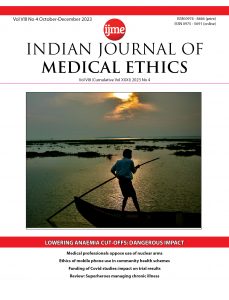
The instant incineration into dust of thousands of people, animals, plants and homes in Hiroshima and Nagasaki in 1945, and the decades-long suffering of the survivors seems to have been forgotten. Medical professionals seek to jog public memory, especially that of world leaders, to heed the frightening threat of a nuclear disaster. An editorial — published in 100+ biomedical journals — a comment, and a review in this issue deal with the threat.
An editorial exposes a second threat — the proposed lowering of anaemia cutoffs in India — with long–term implications for the health of the most deprived women and children.
Other articles draw our attention to ethics in the functioning of community health programmes, verdicts against medical negligence, and the impact of funding on Covid trial results.
This last issue of 2023 also has commentaries on a perceived lack in the Global Mental Health Movement, grave abuses in the name of “conversion therapy”, and whether the mushrooming internet is a boon or bane for healthcare. Two case studies uncover the complex nature of family dynamics and the consequent challenges for researcher-clinicians.
Two equally interesting and heated debates — one on what constitutes reliable data, the other on basic principles in Ayurveda — continue in the journal.
__________________________________________________________________________________________________________
Cover credit: In tune with nature by Dr Anilkumar Patel
